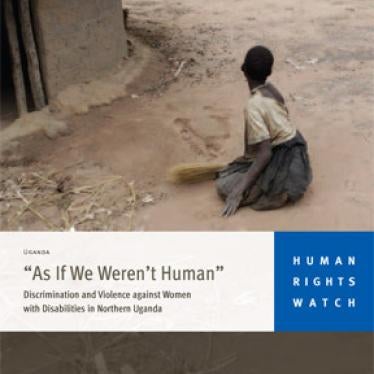Imagine registering to vote in the upcoming election, only to be told by a local government official not to go to the polling place because you would "spoil the election." Betty, a woman I met in northern Uganda, was told just that. Why? Because she is blind.
Or put yourself in the shoes of Alajos Kiss, a Hungarian who was put under partial guardianship at age 51 as a result of mental health problems. Kiss did not realize, however, that accepting guardianship meant losing his right to vote.
The right to political participation is both fundamental to democracy and a fundamental human right. Yet people with disabilities are routinely denied the chance to exercise this right. In many countries, people in wheelchairs or who are blind cannot vote because they cannot reach the polling place or cast a secret ballot. In some countries, people with disabilities who have guardians assigned by the court are automatically deleted from voter registries.
In Peru, for example. Nearly 20,000 people with intellectual and psychosocial disabilities were deleted from the voter registry less than two weeks before the April 10th elections. The justification? This was for their benefit, as they would otherwise be penalized since voting is mandatory in Peru. After disability rights advocates pressed the government, people with disabilities were invited to re-register. But with limited time and poor communication about this decision, only 53 people with disabilities were added back to the roster before the election.
In the case of Hungary, its new constitution states that no one should be discriminated against on the basis of disability. Yet it also permits a judge to take away the right to vote from those with "limited mental ability."
Empowering judges to decide on a case-by-case basis whether a person has the mental ability to vote creates a situation ripe for abuse and selective enforcement. What if the guardian disagrees with the political choices of the person with a disability, for example? Lots of people think that if someone votes for this or that party they must have limited mental capacity: enshrining this bias in a constitution that espouses non-discrimination is a mistake.
Failing to find ways to accommodate people who are blind or visually impaired can also effectively deny these individuals their right to vote, as they must rely on family members or others to read the ballot to them.
Beyond being denied the right to vote, people with disabilities are often denied opportunities to participate more broadly in political activities, like lobbying or running for office. But the very fact that they are often marginalized in their communities makes their participation in the political system that much more important. Disenfranchisement makes it unlikely that elected officials will feel constituent pressure to represent the interests of people with disabilities once these officials take office.
Uganda, Peru and Hungary, along with 97 other countries, have become parties to the Convention on the Rights of Persons with Disabilities. The principles of this treaty - non-discrimination, visibility, empowerment, accountability and participation - are undermined by restricting access to voting and political participation for people with disabilities.
It does not have to be this way.
There are good examples of national laws that protect the rights of people with disabilities to political participation. Both the Netherlands and Italy, for example, have repealed laws limiting the voting rights of people under guardianship and now place no limitations on their political participation. Sweden has universal suffrage; in fact, one of the main reasons Sweden eliminated guardianship was to protect the right to vote. South Africa's Constitution guarantees the right to vote for every citizen, and its electoral law permits assisted voting to people who request help.
Guaranteeing by law the right to vote for all people with disabilities is one step toward ending the practice of treating them like second-class citizens. But changing the law isn´t enough.
Governments need to make sure that voting procedures, facilities and materials are accessible and easy to understand. This includes using assistive technologies and allowing those who need it to have a person of their own choice provide help. Governments also should raise awareness about the need for equal political participation by people with disabilities. This can go a long way in addressing stigma and discrimination in the community, and making sure that people like Betty won't be denied at the polls.
* * *
For more information:
http://commissioner.cws.coe.int/tiki-view_blog_post.php?postId=127
http://www.mdac.info/content/hammarberg-%E2%80%9Cno-room%E2%80%9D-removing-right-vote
http://mdac.info/webfm_send/70
* * *
Shantha Rau Barriga is the disability rights researcher and advocate for Human Rights Watch.








